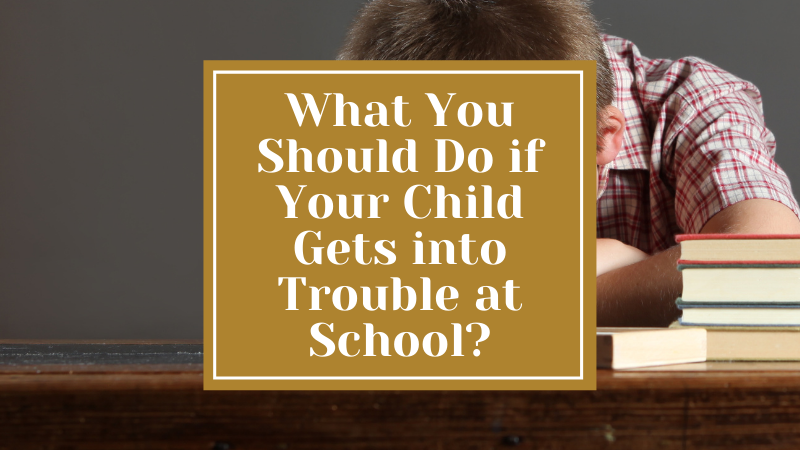Sending your child off to school is a big deal for most moms. You are entrusting them into someone else’s care for a large portion of the day. You have no control over what happens during school times, and you often don’t know what they do during the day.
Losing this control is a step many moms battle with. We like to be in control. We like to lay down the rules for our kids, and we want to be the ones to follow-up if they disobey these rules. At school, they are in a totally different environment. They have a different routine, new rules and new expectations. They are supposed to learn, play and work on their social skills.
All of this together, along with mom and dad not being around, will lead to your little one trying to push the boundaries at times. Because of this, they might land themselves in some trouble at school. Teachers are used to this; they have been dealing with busy kids every day for years. But when it is your child that gets into trouble, you may freak out a bit.
When you hear that your child has done something wrong and has got into trouble at school, remember this is a good thing. You want their teacher to keep them on a good path and correct their behaviour when needed.
Giving up that control to someone else to take charge of your child’s behaviour is tough, and if you need a little guidance on how to deal with it, here are some tips.
1. Assess the situation
You can’t react adequately if you don’t know the full situation. Try and find out what has happened. Take everything with a pinch of salt if it is coming from your child, as they will want to win you over as to not get into trouble again.
Ask questions like “what did you do,” “why was it wrong,” “what made you do it,” these questions will try and help you ascertain what has happened.
2. Find out both sides of the story
Kids will do almost anything to avoid trouble. This applies for home and at school. You need to get both sides of the story. While their intentions aren’t bad, you most probably won’t get an unbiased story from your child and this will make dealing with the situation complicated.
It is important to make your child feel heard and also aware of the boundaries they crossed. If they have an entirely different story than the teacher or another child, acknowledge that while you heard their side of the story, it’s different that the other sides of the story.
Explain what they problem would be with all the different versions of the story, and then give your child a punishment or discipline that is fitting for the situation.
3. Encourage the truth
Encourage the truth at all times. In order to do this, you need to remain calm and unthreatening. If they feel like telling the truth will land them in more trouble, they will avoid it altogether.
However, it is also important to teach them the importance of honest. Explain to them how disappointed you will be if you later find out that they weren’t being honest with you. Explain how you’d feel more upset about the dishonest than with just the situation at hand.
If you are really battling lying and untruthful behavior, try and tell them the story of “The Boy Who Cried Wolf.” This story will help them understand the problems lying can cause. Once they understand the importance of honesty, they will hopefully be more open to telling you what really happened at school.
4. Speak to the teacher
It is always a good idea to speak to the teacher directly. She will be able to tell you exactly what happened and the both of you will be able to try and put measures in place to ensure it doesn’t happen again. Especially if the behavior is becoming a habit.
It is best to both be on the same page because then your child will be encouraged towards good behaviour both at school and home.
5. Explain everything to your child
Once the full story is out, you need to sit down with your child and talk through what has happened. They need to understand why they got themselves into trouble and how they can alter their behaviour to avoid it happening again.
Try to be as honest about the situation as possible. Kids are often smarter and able to handle more that we sometimes give them credit for. Show them that you trust them enough to talk to them with respect and honesty. This isn’t the time to wear your kid gloves around them.
6. Remain calm
It is important to remember that every day is a new learning experience for your child. They need to test their boundaries in order to grow. They will get into trouble sometimes, how else will they learn what is right and wrong?
Instead of getting angry and reacting in a negative way, stay calm and use this opportunity to teach them a lesson. Calmly explain everything to them and they will learn from your disappointment much more than from anger.
Dealing with your child getting into trouble at school isn’t easy the first time round. You want to defend your child, but you still want them to learn from bad behaviour. You need to trust that the teacher will deal with it accordingly, and then you need to sit down with your child and talk through everything that happened.
Instead of becoming upset and angry, rather use it as a way to teach your child good behaviour, and help them learn from their mistakes.
You May Also Like:
Top 10 Things You Can Do to Teach Your Children to Love Good Foods




